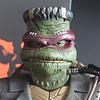Take a photo of a barcode or cover
As an aside, I always picture the bad guy from the Western "For a Few Dollars More" in the role of Waylander.
4 star - i would recommend
3 star - good
2 star - struggled to complete
1 star - could not finish
The book kept me turning page after page. There were a lot of reference to people in the past that I didn't get at the time but it did not matter as a stand-alone (which it could be). But when I realized it's a series I found it very cool how Gemmell wrote character's into his books that seem insignificant at the time that end up as main characters in other books, you can really see the ripple effect in his world building.
The pace of the action in this novel is unrelenting with characters that are so well-conceived and portrayed together with a plot that is excellently executed all written in a style that is effortless to read that this is the definition of a page turner.
I mean you have the old weathered soldier who has lived a morally suspect life, has contemplated retirement, has the same realist "shit happens, but oh well" philosophy usually as a result of a violent, bloody past, with many regrets (and usually his wife and kids have been slaughtered in some kind of awful fashion) - But due to strange circumstance or "fate" he decides to clean up his act and fight one last time, on a seemingly impossible quest to do this "one good deed" and either die or not in a blaze of glory. I mean this story alone sounds pretty promising, pretty awesome, but after three carbon copies of the same story and cardboard cut-outs for characters... It... Gets samey.
There were a few very annoying things, that paired with how similar it is with his preceeding novels that caused me to knock this off a star. *Warning Rant Ahead*
I didn't get this so much in "Legend" but in this book and "King Beyond the Gate" the women are all so thoroughly two dimensional, so throwaway and pathetic, and are all treated as such. I'm pretty sure every female character in this book (other than the two children) were painted as "whores" or rape victims, both of which are shown as irritating nags when they don't bend to the MC's will at the flick of a wrist (don't worry, they usually do). Danyal, for example, multiple rape victim, get's talked to like absolute shit by Waylander, Waylander says "he would never go with a woman he wouldn't pay for", this is the basic extent of their conversation before she falls head over heels in love with him. Sounds legit. He also physically abuses a prostitute, leaving bruises on her arm saying he got "carried away" - this is especially problematic because he's frequently described that despite his many flaws, he would never abuse a woman, by the narrater! Clearly you do tho. Rape tropes in fantasy are cliche, but when they're used as a plot device and gratuitously, it's cheap, and grating, not to mention disrespectful.
/rant.
Despite all this I wouldn't say this was an *awful* book, and I can definitely see why people would be happy to get away from the stodgey descriptions and intimidating tomes that usually permeate the fantasy genre. These books are fun, uncomplicated, and the action scenes are fantastic. Unfortunately I would suggest that unless you're happy with the same story being fed over and over again to purchase Legend and not bother with the two suceeding novels.
Mr Gemmell's third novel marks a bit of a change in direction for him. He is still telling ridiculously entertaining stories about impossible deeds performed by incredibly competent people who are remarkably dangerous to be around and who also hold themselves to unbelievably high standards of behaviour. But this time, he's managed to add a little more depth to the story - it's almost literary in quality.
Now, I'm not saying that this is a bad thing. Far from it. But here we have a swing in a direction that I don't remember him deviating far from for the rest of his career.
It's a bog-standard city-under-siege, hero-performs-impossible-quest tale but the characters feel as though they have more shading to them than in his previous novels (which I love, by the way). It also takes place earlier than the two previous novels and we see the appearance of characters mentioned in previous novels, as well as the creation and development of several aspects of the world of the Drenai.
The standout is, of course, Waylander, the soldier-turned-assassin who undergoes redemption when he saves the life of a priest being tortured by mercenaries. In fact, the encounter changes them both, which creates ripples outward into the world around them and into the history that Gemmell was creating. Waylander was a different type of hero to those he had written before: he is much darker than Druss or Rek or Tenaka Khan and has a more ruthless streak than anyone in his books to date. He kills without a snarky rejoinder or even a warning and he seems to rationalise the deaths he causes far more calmly than any other character so far.
Being a Gemmell novel there are many conversations about the morality of war and violence and how effective or even ethical it can be, even in the service of protecting the innocent. Gemmell, once again, comes to no real conclusion - or doesn't allow one onto the page - because it isn't a debate that can ever end or have a proper answer. Dardalion, the priest saved by Waylander, forms the Thirty, the warrior mystics beloved by fans and begins the endless cycle of debates about whether or not violence in the name of higher purposes is ever right or valid.
What is really interesting here are the questions raised by situations, questions we get explored further in later novels: can a life of violence ever be properly redeemed by a person's actions? Are there any causes that are worth giving your life for? What role do politics and cynicism play in heroics?
But there's a great yarn buried under the musings on life and purpose. As I said, it's a fairly standard tale but Gemmell infuses everything he writes with an urgency and tension that leaps off the page. It's also the first time that I noticed how much like a western Waylander's quest in the second half of the novel is. Given the plot of the next novel by Gemmell, I wonder how much of that was influenced by this.






